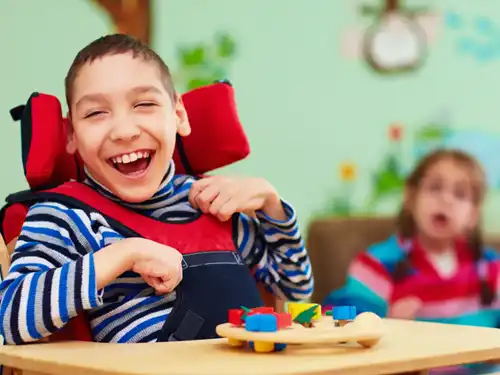
What is Autism Spectrum Disorder (ASD)?
Autism, also known as Autism Spectrum Disorder (ASD), is one of the most discussed developmental conditions today. Parents often have many questions about what autism means, how it is diagnosed, and how it can be managed. To make it easier, here’s a detailed guide with answers to the most commonly asked questions about autism.

Autism Spectrum Disorder (ASD) is a developmental condition that affects how a person communicates, behaves, and interacts with the world. It is called a “spectrum” because symptoms and abilities vary widely from person to person. Some individuals may need significant support in daily life, while others live independently. Common features include difficulty in social communication, repetitive behaviors, and unique ways of learning or responding to situations. Autism is not a disease but a different way of brain development. Early diagnosis and intervention help improve learning, communication, and overall quality of life for people with autism.
What are the early signs of Autism Spectrum Disorder (ASD)?
Early signs of autism usually appear in the first two to three years of life. Common signs include delayed speech, lack of eye contact, limited response to name, and reduced interest in playing with others. Some children may show repetitive behaviors such as hand flapping, rocking, or lining up toys. Others may prefer routines and become upset with small changes. They may also show unusual sensitivity to sounds, lights, or textures. Not all children show the same signs, but noticing these early differences helps parents seek evaluation. Early detection improves chances of effective therapy and better long-term outcomes.
What are the symptoms of autism in children?
Children with autism may show a variety of symptoms. Common signs include delayed speech or no speech, difficulty understanding social cues, limited eye contact, and reduced interest in playing with peers. They may repeat actions like hand flapping, rocking, or repeating words. Many prefer strict routines and get upset with changes. Sensory sensitivities, such as covering ears to avoid noise or avoiding certain textures, are also common. Some children may have special skills in memory, music, or numbers. Symptoms vary widely, so not every child shows all signs. Early recognition helps start therapy and improves long-term outcomes.
What are the symptoms of autism in adults?
Adults with autism may experience difficulties in social interaction, such as understanding body language, tone of voice, or unwritten social rules. They may prefer routines and feel stressed with sudden changes. Many adults with autism find it challenging to form relationships or maintain eye contact, though some excel in specialized areas of interest like technology, art, or mathematics. Sensory issues, such as sensitivity to noise or textures, may also persist. Some adults may remain undiagnosed until later in life, especially if symptoms are mild. With awareness, support, and workplace accommodations, adults with autism can lead fulfilling lives.
What causes Autism Spectrum Disorder (ASD)?
The exact cause of autism is still not fully understood. Researchers believe it results from a combination of genetic and environmental factors. Genetic differences influence brain development and increase the likelihood of autism, while environmental factors during pregnancy or early childhood may contribute. These may include advanced parental age, pregnancy complications, premature birth, or exposure to certain infections or toxins. Autism is not caused by parenting style or emotional issues. It is important to understand that autism is a neurodevelopmental difference, not a disease, and focusing on early support helps individuals thrive regardless of the underlying cause.
At what age can autism be diagnosed?
Autism can often be diagnosed reliably by age two, though some signs may be noticed earlier. Parents usually observe developmental differences when a child is between 12 to 18 months old, such as a lack of babbling, limited eye contact, or the absence of gestures like pointing. By age two, speech delays and social interaction difficulties become clearer. Doctors use developmental checklists, behavioral observations, and standardized tests to diagnose. In some cases, autism is not recognized until school age, especially in mild forms. The earlier autism is identified, the sooner therapy and support can begin, leading to better progress.
How is autism diagnosed?
Autism Spectrum Disorder (ASD) is diagnosed through careful observation, developmental history, and standardized assessments. Doctors and specialists evaluate how a child communicates, interacts, and behaves in different settings. There is no single medical test, like a blood test, for autism. Instead, tools such as the Autism Diagnostic Observation Schedule (ADOS) and Autism Diagnostic Interview-Revised (ADI-R) are commonly used. Pediatricians may also check for speech delays, repetitive behaviors, and sensory sensitivities. In adults, evaluation often involves interviews and behavior checklists. Early and accurate diagnosis allows families to begin therapy, educational support, and interventions that greatly improve long-term development and independence.
Is Autism Spectrum Disorder (ASD) genetic?
Yes, genetics plays a major role in autism. Research shows that autism tends to run in families, and having a sibling with autism increases the chances of another child being affected. Scientists have identified several genes linked to brain development that may increase risk. However, no single gene causes autism; it usually results from a combination of multiple genetic variations. Environmental factors may also interact with genes to influence development. This is why symptoms vary widely among individuals. Understanding the genetic link helps families recognize early signs and encourages early evaluation for better management.
Can children with autism live a normal life?
Yes, many children with autism can live a normal and fulfilling life, especially with early support and the right therapies. Children can learn essential communication, social, and self-care skills, but others grow up to live independently, pursue higher education, and build careers. With supportive families, inclusive education, and understanding communities, children with autism thrive and develop unique strengths. Each child’s journey is different, but with love, patience, and therapy, many lead happy lives and contribute positively to society. Early intervention makes the biggest difference.
How can parents support a child with autism?
Parents play the most important role in supporting a child with autism. The first step is early diagnosis and beginning therapies as soon as possible. Parents can create a structured, predictable routine at home to make the child feel secure. They should encourage communication, even if it’s nonverbal, and celebrate small achievements. Patience and consistency are key in teaching new skills. Parents can also work closely with therapists, teachers, and doctors to ensure holistic care. Providing emotional support, avoiding overstimulation, and focusing on the child’s strengths help them grow with confidence. A loving environment makes a big difference.
Role of Homoeopathy in Autism Spectrum Disorder (ASD) Treatment
Homoeopathy can play a supportive role in the management of autism. It is a safe, natural approach that focuses on the individual as a whole. Remedies are selected based on the child’s behavior, emotions, sensitivities, and overall constitution. Homoeopathy helps reduce anxiety, improve adaptability, enhance sleep, and support better emotional balance. When combined with speech therapy, occupational therapy, and behavioral interventions, homeopathy adds value as a gentle, non-toxic option for parents looking for holistic care.
Why choose Dr. Sanjay Homoeopathy for Autism Spectrum Disorder Treatment in Lucknow, India?
Dr. Sanjay’s Homoeopathy is a trusted center for safe and effective Autism Spectrum Disorder (ASD) treatment in Lucknow, India. With years of clinical experience, Dr. Sanjay provides specialized autism homeopathic treatment that focuses on improving behavior, communication, concentration, and emotional well-being in children with ASD. As a leading homeopathic doctor in Lucknow, he follows international treatment standards and offers individualized care tailored to each child’s needs. Parents choose Dr. Sanjay’s Homoeopathy for its holistic approach, compassionate care, and positive outcomes in managing Autism Spectrum Disorder naturally without side effects.
Patients from across the world trust Dr. Sanjay’s Homoeopathy for Autism Spectrum Disorder Treatment in Lucknow, India. Dr. Sanjay Singh, who led this clinic, has successfully treated thousands of patients with Autism Spectrum Disorder, which makes him the best homeopathic doctor for Autism Spectrum Disorder Treatment in Lucknow, India.


